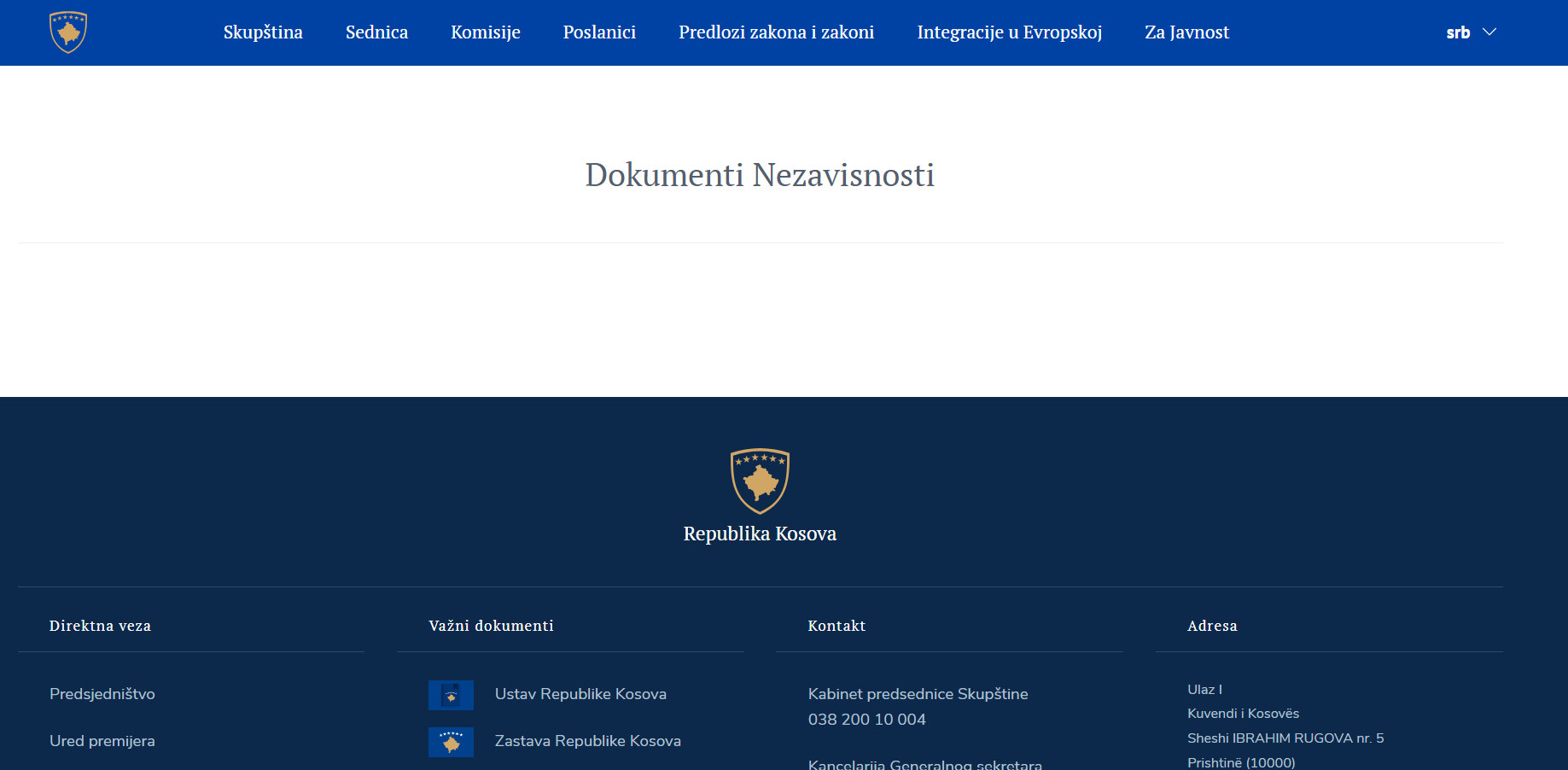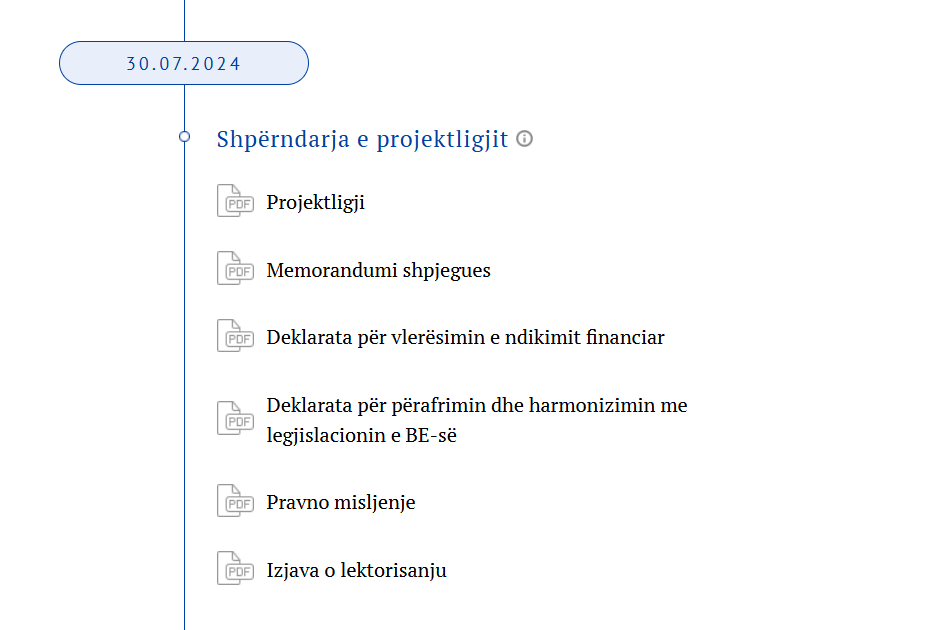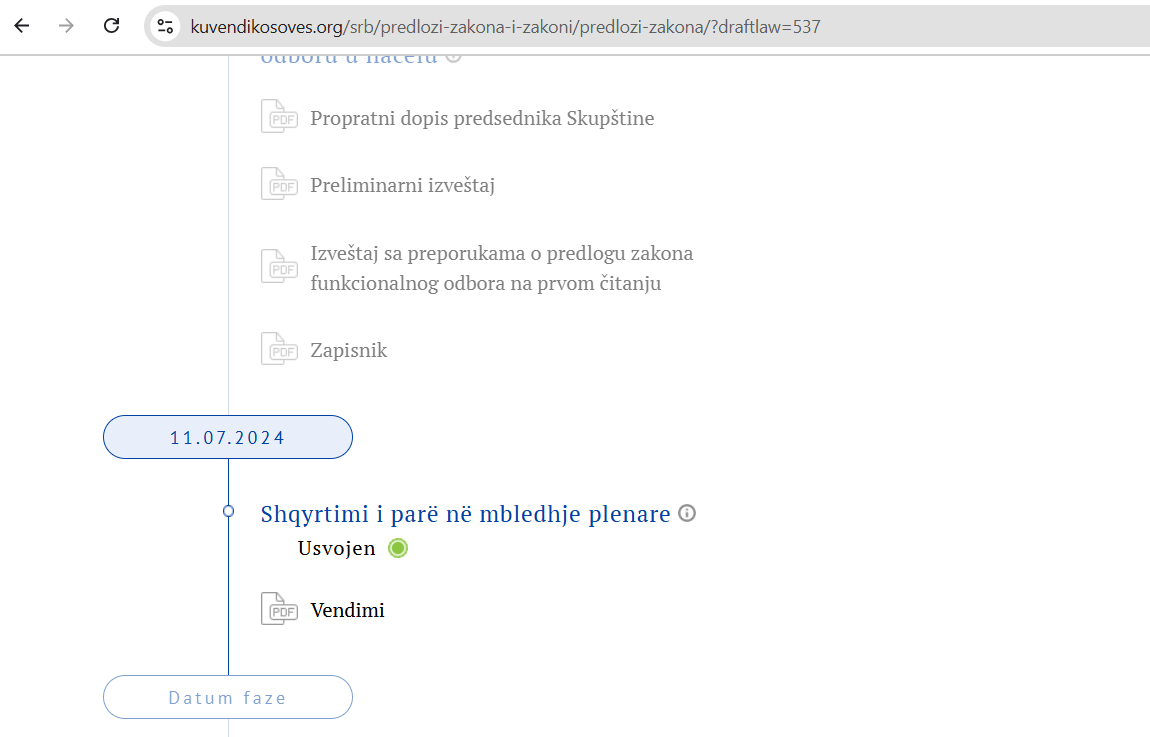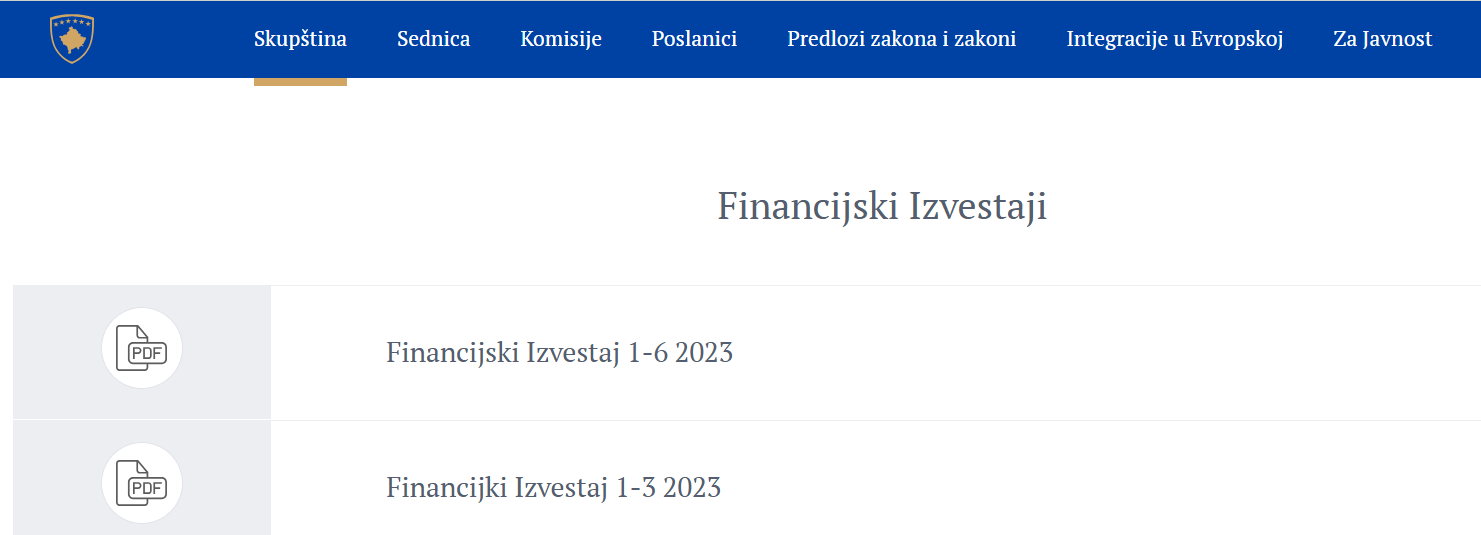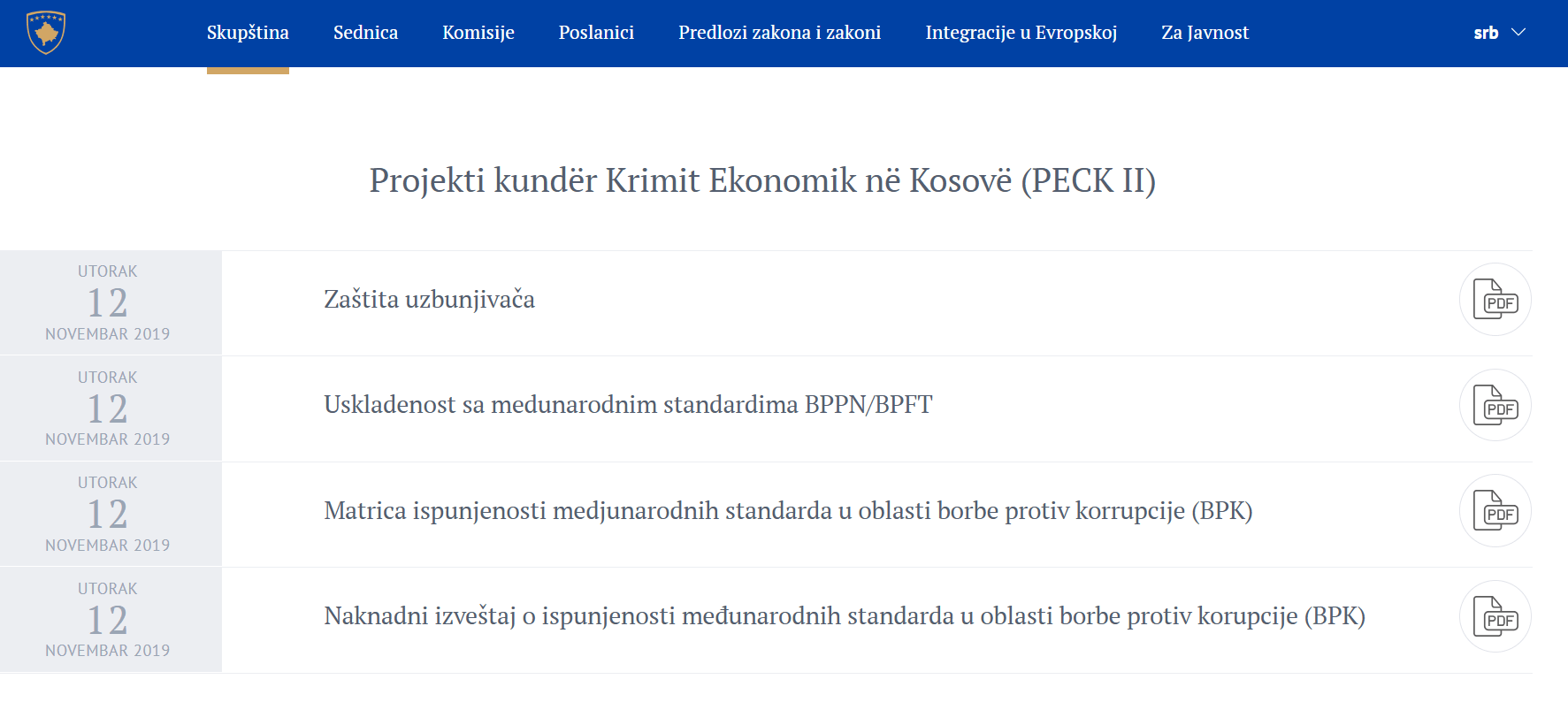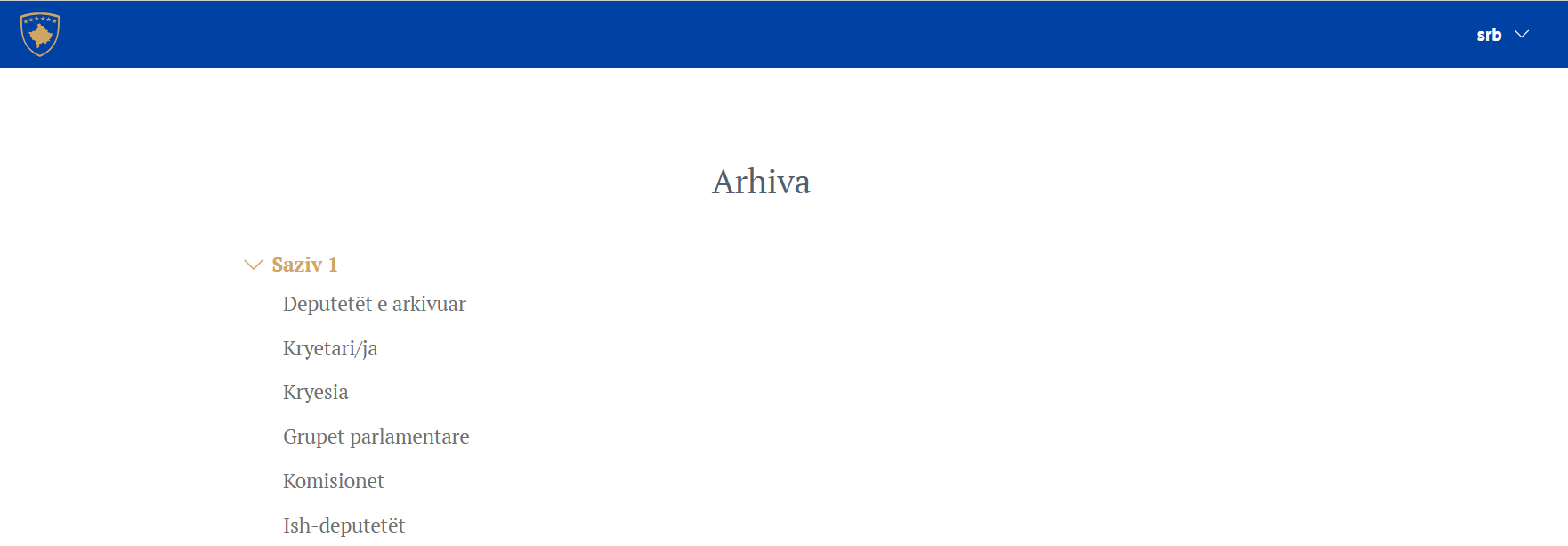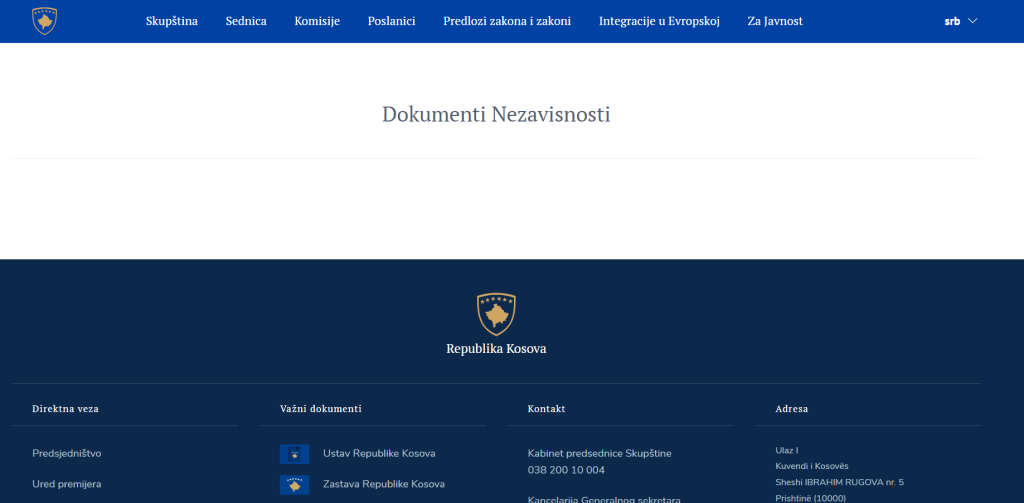The absence of certain documents, categories and subcategories, strategic plans, as well as information on specific public calls, is the main finding following an analysis of the official website and social media accounts of the Assembly of Kosovo. The issue of inconsistent content is not limited to written materials, several video materials are, in most cases, available only in Albanian, without accompanying audio or written translation in Serbian.
The problem of systematic violations of the Law on the Use of Languages in Kosovo has been pointed out for years. However, it persists despite the legal framework[1] that guarantees the equal use of Serbian and Albanian as official languages. As a result, non-majority communities—specifically those who use the Serbian language—remain deprived of key information. Moreover, this issue was highlighted in the 2023 European Commission Report on Kosovo[2] where multiple sections refer to these violations.
Therefore, NGO Aktiv, Radio Kim, the New Social Initiative (NSI), Radio Gorazdevac, and the Advocacy Center for Democratic Culture (ACDC) continue their public advocacy campaign aimed at encouraging institutions to address this long-standing problem. This week’s focus is the Assembly of Kosovo. After reviewing its official website and social media channels, we conclude that the presence of the Serbian language is partial, despite being, alongside Albanian, an official language in Kosovo.
The Assembly of Kosovo, as the highest legislative body, plays a crucial role in implementing constitutional and legal provisions, including the Law on the Use of Languages. This institution is expected to set standards of transparency, equality, and accessibility for all citizens, regardless of their linguistic background. Respect for language rights, especially in institutions such as the Assembly, directly influences the level of trust that minority communities place in the institutional system. Serbian, alongside Albanian, is an official language in Kosovo. Therefore, its consistent presence in the work and communication of the Assembly is not a technical issue but a legal obligation. Disregarding this obligation sends a message of exclusion and fosters a sense of institutional inequality. This is precisely why the consistent implementation of the Law on the Use of Languages in the Assembly is fundamental for building an inclusive and democratic society.
What Did We Discover on the Website of the Assembly of Kosovo?
Independence Documents: One of the most apparent examples of violations of the Law on the Use of Languages is found in this category. On the Serbian-language version of the site[3], only the title is available, no documents are provided, whereas on the Albanian version[4] all relevant documents are properly uploaded.
Draft Laws[5]: In this section of the Serbian version, although some documents are provided in Serbian, several of their titles appear in Albanian. A similar situation occurs in the “Laws” category[6].
Job Vacancies[7]: This section presents yet another example of unaligned content between the Serbian and Albanian versions of the site. On the Serbian side, aside from the title of the category, no documents are available, while the Albanian version contains detailed results of job competitions.
President of the Assembly: In the section of the site dedicated to the biography of the President of the Assembly, the only information available in Serbian[8] is the name and title of the officeholder. By contrast, the Albanian version[9] includes a detailed biography with extensive information on qualifications, education, and professional background.
Voluntary Parliamentary Groups: This category includes two subcategories, “Women’s Parliamentary Group”[10] and “Young MPs Group”[11]. On the Serbian-language version of the site, these subcategories are titled in Albanian.
Procurement[12]: An identical issue is observed in this category, documents listed in the Serbian-language section of the website are titled in Albanian. A similar situation is found in the category “Project for Combating Economic Crime”[13].
Previous Legislatures[14]: On the official website of the Assembly, in the section dedicated to presenting previous legislatures, almost all attached information in the Serbian-language version is provided in Albanian.
ASI Newsletter: The documents listed under this category in the Serbian-language section[15] of the website cannot be opened.
Memorandum[16]: An analysis of this category revealed that nine documents are available in the Albanian section, while only eight are uploaded in the Serbian section. Furthermore, one of the documents in the Serbian-language section is titled in Albanian.
Budget Analysis: This is another example of content inconsistency. In the Serbian-language section[17] of the site, only one document is available, while three are provided in the Albanian section[18].
Strategic Plan[19]: In the category related to the Assembly’s strategic plan, the document for the 2022–2025 period is available exclusively in Albanian, despite being located in the Serbian-language section of the website.
International Cooperation: In the Serbian section of the site, this category is labeled in English. Compared to the Albanian version, two subcategories are missing.
Report Processing[20]: The category containing information about the official responsible for receiving and processing reports is available exclusively in Albania.
Plenary Session[21]: General information about the functioning of Assembly sessions, provided in the Serbian-language section of the website, is presented in a language that is not official in Kosovo—English.
Media[22]: In the section related to media, the Serbian version of the website is missing the subcategory “Strategy for Information and Communication of the Assembly of the Republic of Kosovo”, which is available in the Albanian version.
Parliamentary Transparency Forum[23]: Another example of inconsistency in the provided documentation is found in this category. While six documents are attached in the Albanian version, only five are available in the Serbian version.
Legislative Research: A similar issue is observed here. Apart from a brief category description in Serbian, no documents are attached, whereas two documents are accessible in the Albanian version of the website.
Social Media
Facebook[24]: On the Assembly’s official page on this social network, most informational posts and activities are available in Serbian, including video content such as holiday greetings, campaigns, and the commemoration of international days. However, when it comes to the live streaming of plenary sessions, written or audio translation into Serbian is missing.
YouTube[25]: A similar situation is observed on this platform. Some informational video materials are available in Serbian, but the majority of content, including session broadcasts and MPs’ statements to the media, is available exclusively in Albanian, without translation into Serbian.
Why Is This Important?
As we pointed out in several previous analyses where we identified examples of poor practice, this continuation of our campaign once again confirms that the systematic neglect of the Serbian language in Kosovo’s institutions remains a serious issue. Such practices prevent equal access to information for non-majority communities and represent a direct violation of the Law on the Use of Languages.
This law clearly stipulates that Albanian and Serbian are equal official languages in Kosovo. Yet, the years-long practice of ignoring this issue and the silence in the face of continuous violations of language rights deny Serbian-speaking citizens and other non-majority communities their constitutionally and legally guaranteed right to equal access to information of public importance.
Therefore, it is essential to replace the use of unqualified translators or automated tools such as Google Translate with qualified professionals who can ensure accurate and unambiguous translations into Serbian. Establishing a functional translation system would guarantee uninterrupted access to public information and, more importantly, demonstrate the institutions’ genuine commitment to fully respecting not only language rights, but also fundamental human rights — including the rights of non-majority communities as guaranteed by the Universal Declaration of Human Rights[26].
While civil society organizations, operating with limited resources, regularly provide trilingual presentation of their activities, the Assembly of Kosovo, as the highest legislative authority with significantly larger budgets and resources, undoubtedly had the means to ensure adequate Serbian-language translation.
We therefore call on the Assembly of Kosovo to promptly initiate the process of aligning language versions of published content on its website and social media channels, ensuring equal access to information in both official languages.
Once again, we urge the Office of the Prime Minister to move away from political rhetoric without tangible results and abandon a declarative approach to minority rights. Instead, it should instruct relevant institutions to harmonize language use across all legally mandated levels.
At the same time, we appeal to the Office of the Language Commissioner to begin enforcing the legal provisions within its mandate. This includes building an institutional environment that respects constitutional and legal obligations, and actively protects, promotes, preserves, and enforces the language rights of all citizens of Kosovo.
Finally, we encourage all citizens to take an active role in this process by reporting observed language irregularities to the responsible institutions, such as the Office of the Language Commissioner (zkgj.kpj@gmail.com) and the Ombudsperson Institution (info.oik@oik-rks.org). Additionally, we invite citizens to contact NGO Aktiv (office@ngoaktiv.org) whenever they encounter language-related anomalies and join us in urging relevant institutions to uphold legally mandated standards.
[1] https://kryeministri.rks-gov.net/wp-content/uploads/2022/05/ZAKON_BR._02_L-37_O_UPOTREBI_JEZIKA1346.pdf
[2] https://enlargement.ec.europa.eu/document/download/c790738e-4cf6-4a43-a8a9-43c1b6f01e10_en?filename=Kosovo%20Report%202024.pdf
[3] https://www.kuvendikosoves.org/srb/dokumentet-e-pavarsise-se-kosoves/
[4] https://www.kuvendikosoves.org/shq/dokumentet-e-pavarsise-se-kosoves/
[5] https://www.kuvendikosoves.org/srb/predlozi-zakona-i-zakoni/predlozi-zakona/?draftlaw=579
[6] https://www.kuvendikosoves.org/srb/predlozi-zakona-i-zakoni/predlozi-zakona/?draftlaw=505
[7] https://www.kuvendikosoves.org/srb/punesimi/radna-mesta/
[8] https://www.kuvendikosoves.org/srb/predsedsednik-skupstine/
[9] https://www.kuvendikosoves.org/shq/kryetari-i-kuvendit/
[10] https://www.kuvendikosoves.org/srb/grupet-vullnetare-te-deputeteve/grupi-i-grave-deputete/
[11] https://www.kuvendikosoves.org/srb/grupet-vullnetare-te-deputeteve/grupi-i-deputeteve-te-rinj/
[12] https://www.kuvendikosoves.org/srb/izvestaji/nabavka/
[13] https://www.kuvendikosoves.org/srb/raporti/projekat-za-borbu-protiv-privrednog-kriminala/#
[14] https://www.kuvendikosoves.org/srb/arkiva-e-legjislaturave/
[15] http://old.kuvendikosoves.org/?cid=3,174
[16] https://www.kuvendikosoves.org/srb/naslovna/dokumente/memorandum/
[17] https://www.kuvendikosoves.org/srb/naslovna/dokumente/budzetska-analiza/
[18] https://www.kuvendikosoves.org/shq/ballina/dokumente/analize-buxhetore/
[19] https://www.kuvendikosoves.org/srb/naslovna/dokumente/strateski-plan-skupstine-republike-kosovo-202/
[20] https://www.kuvendikosoves.org/shq/sinjalizimi/#
[21] https://www.kuvendikosoves.org/srb/sessions/sednica/
[22] https://www.kuvendikosoves.org/shq/procesi-i-integrimit-ne-bashkimin-evropian/
[23] https://www.kuvendikosoves.org/srb/per-publikun/forum-za-transparentnost-parlamenta/
[24] https://www.facebook.com/kuvendi.skupstina/
[25] https://www.youtube.com/channel/UC4Xc2nL2i8Pu3PL_tljnjjg/videos
[26] https://www.ohchr.org/en/human-rights/universal-declaration/translations/serbian-latin-srpski

